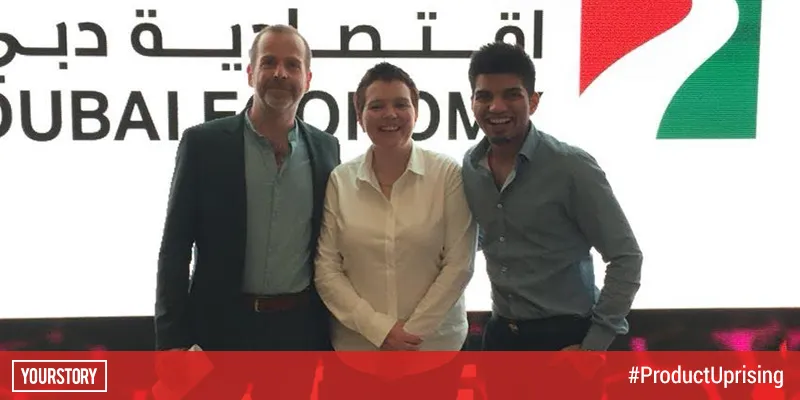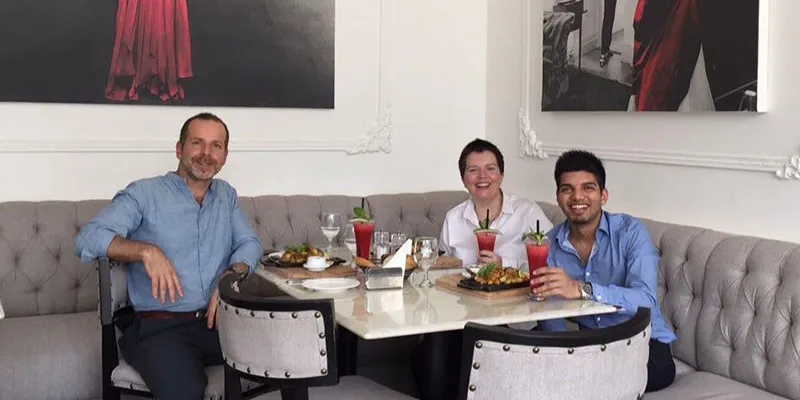Project Shivom integrates healthcare with medical genomics on the Blockchain
Software product companies have never been our calling card. India has traditionally struggled to produce champion companies in this space, due to a variety of factors. YourStory brings to you a dozen startups in the space, under #ProductUprising which have the potential to scale, despite the hurdles
Ludhiana-based Project Shivom is creating an open web-marketplace for healthcare providers to add apps and services, alongside genomic data analytics, to drive personalised medicine.
Startup: Project Shivom
Founder: Gourish Singla, Sally Eaves, and Axel Schumacher
Year it was founded: 2016
Sector: Healthcare
Funding raised: Angel funding
Based out of: Ludhiana
Imagine if preventive healthcare could turn predictive in a way that it predicts a disease or disorder before any known test can discover it?
That’s what Gourish Singla, an investment banker; Sally Eaves, a fintech professor and global strategic advisor; and Axel Schumacher, author and a scientist with over 20 years of experience in genomics, epigenetics, and biomarker discovery; felt.
The trio felt a need to empower people and open up patient choice; a need to enable access to enhanced and connective healthcare provision. That’s how Project Shivom was born.
Project Shivom works as an ecosystem that offers an open web-marketplace for other providers to add their apps and services, alongside genomic data analytics and personalised medicine. All this by using a Blockchain-enabled platform – the first instance of this.

Blockchain meets healthcare
Gourish explains:
“The idea to use blockchain came up quickly. But only after Axel published his book Blockchain & Healthcare Strategy Guide 2017. It had become clear that the world needed a whole new precision medicine ecosystem. Feedback from scientists, business managers, and non-profit organisations across the world flowed in. There are thousands of companies worldwide that can potentially profit from working with Shivom.”
The healthcare industry in India lacks a definitive system that can quickly record data, and ensure it is secure and shareable. Blockchain is a powerful tool as data cannot be altered or accessed, owing to the large chains of blocks that are interconnected through numerous networks. This makes it appropriate for several healthcare transactions and patient data. The data can also be linked to a global information network, which makes it available to healthcare providers across the network without compromising on security.
The Project Shivom team is essentially building an ecosystem that involves distributed ledger architecture where other partner companies will add apps and services to a genomics storage and analytics platform.
“The genomics and healthcare database that we are building will be the central part of this ecosystem and will provide a significant portion of the value,” Gourish says.
The core platform elements will be co-developed by the main customers (that is, pharmaceutical companies), which will ensure that the platform has the widest possible adoption in the target market.
“Analytics and deep learning algorithms will be developed with partner companies and academic groups. Special analytics/AI services, e.g. cloud-based genome analytics, will primarily be provided by cloud analytics partners. Together this platform ecosystem will aim to be the largest genomics and health care data hub around the globe, enabling this data to be accessible to every person,” Gourish says.
The platform and its workings
Shivom has extended its services to form a global network of genomic counsellors and associated laboratories for a fully integrated service system in a high-scale fashion. Through Shivom, the team also aims to launch a not-for-profit R&D organisation based on collaboration and open innovation, one that optimally connects patients, clinicians, researchers, insurers, and clinical laboratories to one another.
By targeting low-income and developing countries, Shivom will deliver genomics to global healthcare ecosystems and rural areas where these services have not been previously available. This will enable clinicians and patients with genomic information that can be used to guide decisions about personalised care, protecting research-participant interests in a manner that promotes maximum public benefit.

The core team
The Shivom team includes people with knowledge and skills across multiple specialisations such as Blockchain, cryptocurrency, finance, healthcare, genomics, business development, marketing, and social impact.
The core team also comprises Per Lind, Akash Gaurav, and Kumar Gaurav. Per is a business development expert and Co-Founder of IOTA Foundation. He has worked with Carlsberg, IKEA, WPP (and associated agencies), and many other global brands. A specialist in sales on the highest possible levels to enterprise customers, he wants to change the world through experience management - interconnecting companies with stakeholders to continually improve their brand quality and customer experiences.
As a blockchain entrepreneur, Akash founded blockchain company Auxesis Group during his undergraduate course at IIT Bombay. Auxesis today is counted among the Top 100 Most Influential Blockchain Companies in the World. In addition, he founded Blockchain Lab India and is on the advisory board of hot blockchain start-up Cashaa, a zero-fee money remittance company, and VEDA, an enterprise decentralised apps network.
Kumar, serial entrepreneur, is involved with some of the most exciting fintech businesses around the globe. He is among the Top 100 Most Influential People Leading the Evolution of Blockchain and was awarded Extraordinary status (O1) by the United States government. He is the founder of Cashaa, a Blockchain-based payment and banking startup, and the Chairman of Auxesis Group.
The challenges
However, the task ahead wasn't easy. One of the major challenges was dealing with the enormous complexity of finding solutions to integrate converging technologies. There are only a few experts worldwide with experience in different sectors such as genomics, Blockchain, genomics technologies (metabolomics, epigenomics etc), and artificial intelligence.
Building a complex data-driven platform is difficult and the team knew that most organisations aren't able to build them because they almost always lack the knowledge of one necessary domain.
“Our founder team has the rare expertise from previous developments of a top blockchain framework (Auxledger), helping building a genomics and precision medicine platform, and years of strategic business expertise in building new data-driven business models in the precision medicine space,” Gourish explains.
Others in the space
Every industry and sector seems to have suddenly woken up to the benefits blockchain can bring. An IBM survey stated that 16 percent of healthcare executives had plans to implement a commercial blockchain solution this year; close to 56 percent are expected to do the same by 2020.
While India has a long way to go, there are a growing number of blockchain and healthcare companies across the globe. These include YouBase, Stratum, ScalaMed, SimplyVital, PokitDok, and several others.
These primarily allow patients to manage data and even grant access to clinicians, family members, and researchers.
What’s the difference?
Project Shivom, however, says it is different.
“We are unique from our competitors across the genomics and the blockchain healthcare space due to our profound business and data privacy model. Shivom’s comprehensive business model leverages game theory and network effects to establish a fully integrated healthcare service system with long-term sustainability and the possibility for users to monetise their data, by charging for usage” Gourish says.
He explains that many firms rely on outdated Blockchain models (eg, Bitcoin). Some of them use closed proprietary systems that will kill all network effects, or are too complicated and not user-friendly.
“Our team already has experience in building highly scalable precision medicine and bioinformatics platforms. To that end, we do not regard other solution providers as competition; rather, we invite them to work with us to form a better and stronger medical genomics ecosystem to collaboratively create seismic changes in how individuals receive medical care and how therapies will be developed,” Gourish says.
The revenue model
Shivom’s revenue model is based on the sale of OmiX tokens to pharma, research organisations, and other stakeholders interested in obtaining genomic and healthcare data for advancing research and medicine.
Additionally, revenue will be generated by the sale of gene-sequencing kits to donors who are interested in obtaining their DNA information as well as selling other services through partner organisations on the Shivom marketplace.
The team is looking at multiple revenue streams with different economic models. Following the token crowd-sale, the team is now focused on research and development of the genomics database for upload, storage, and analysis of genomic data, and associated phenotypic healthcare data from donors.
What’s up next?
Project Shivom raised an angel round of funding in 2017. The majority of these funds have been used to generate marketing materials, build early partnerships, and begin production of an early version of their product.
“Since then we are actively preparing for our upcoming crowd-sale where we aim to raise the funds that we need to continue our development work,” he says.
Shivom also plan to build a drug R&D unit and genetic counselor network, and expand their partnerships to include numerous analytic services and AI algorithms to enable high-quality data analysis.
“With this we will initiate sequencing projects globally to collect samples, extract DNA, and analyse data from donors all over the world to build a large-scale dataset. We also plan to recruit numerous research organisations and pharmaceutical companies to partner and guide us in product development to address these stakeholders’ immediate needs for quality genomic data,” Gourish says.







